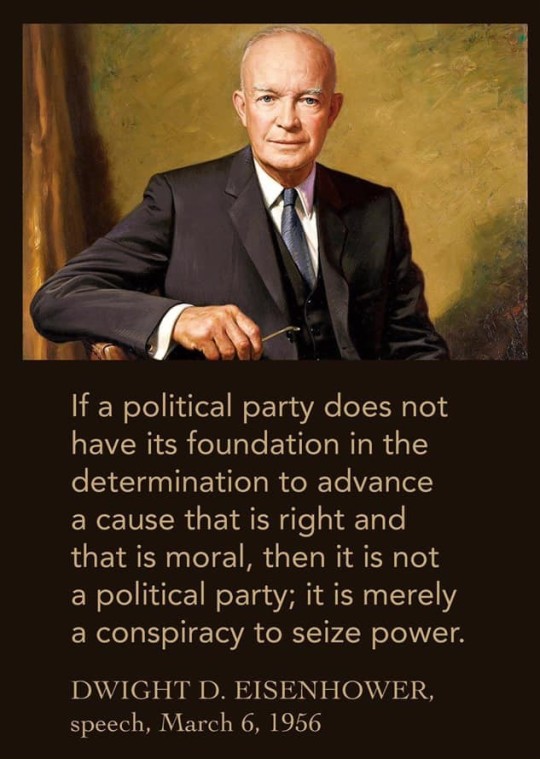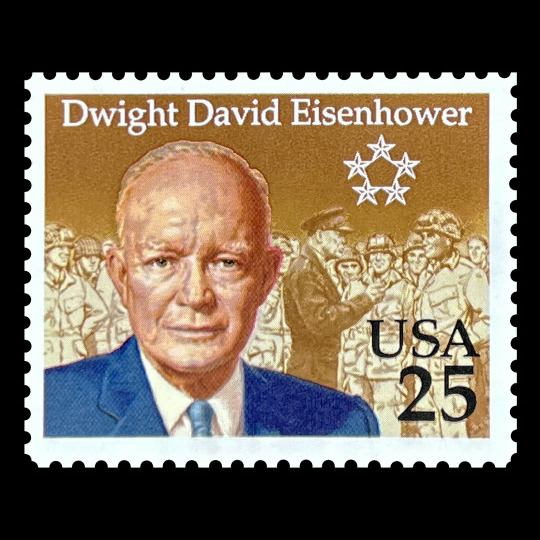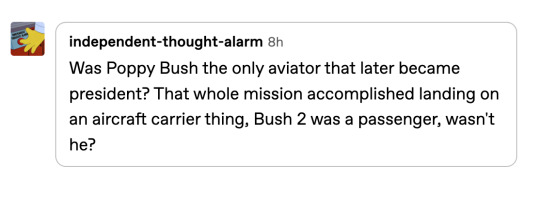#president dwight d. eisenhower
Text

#us politics#quotes#president dwight d. eisenhower#1956#progressivism#progressives#societal advancements#morality#conspiracy theorists#conspiracy theories
60 notes
·
View notes
Text
Texas gubernatorial candidate Beto O’Rourke and Lt. Gov. Dan Patrick, who is seeking reelection, have been crisscrossing the state in the lead-up to Tuesday’s election, visiting megachurches and smaller houses of worship packed tight with parishioners.
The stops are part of a longstanding tradition for political candidates that often accelerates as Election Day nears.
Two Sundays ago, O’Rourke, a Democrat, and Patrick, a Republican, visited different churches where pastors praised them and allowed them to give speeches about the upcoming election. This was in violation of federal law, according to tax law experts. Known as the Johnson Amendment, the law bars tax-exempt organizations from intervening in political campaigns.
At St. Luke “Community” United Methodist Church in Dallas on the morning of Oct. 23, Pastor Richie Butler introduced O’Rourke to his congregation as “the next governor of Texas.”
“He needs us to get him across the finish line,” Butler told parishioners.
O’Rourke then walked to the stage, where he gave a speech that would be familiar to those who have seen him on the campaign trail. He called for fixing the state’s electric grid and expressed alarm over the high rate of school shootings and gun violence.
“If our votes were not important, they would not be trying so hard to keep us from voting in this election, and our vote is how we overcome,” O’Rourke told the crowd.
The same morning, hundreds of miles away, Pastor Steve Riggle introduced Patrick to his congregation at Grace Woodlands Church north of Houston by saying the Lieutenant Governor is someone that “God has given us at the very top.”
“If the nation is to be saved, it’s going to take some leaders who, beyond their concern about being reelected, will stand for values that are critical to the future of this nation,” Riggle said. “Dan Patrick is one of those.”
Patrick then took the stage and cast the election in stark terms. “This is not a race between Republicans and Democrats,” he told the congregation. “This is a race about darkness and light. This is a race about power and principalities. And the devil is at full work in this country.”
He later added: “I don’t even recognize the other party. It’s been taken over by communists and socialists.”
Tax law experts told ProPublica and The Texas Tribune that the pastors’ support of the candidates in their sermons violated the Johnson Amendment. The experts also raised concerns about what appeared to be the churches’ failure to give equal time to their opponents. O’Rourke is facing Republican Gov. Greg Abbott in the general election, and Patrick is being challenged by Democrat Mike Collier.
“Beto O’Rourke is introduced as the ‘next Governor of Texas,’ which highlights both that he is a candidate and one whom the church supports,” said Lloyd Hitoshi Mayer, a tax and election law expert at the University of Notre Dame. “And O’Rourke’s comments are a sales pitch for his candidacy. There is no indication that any opposing candidate has been given a similar opportunity, and, even if he had been, the favorable introduction of O’Rourke would still be across the line.”
St. Luke Pastor Butler did not answer questions about Mayer’s assessment or whether the church had also invited Abbott to speak.
“Black churches have been important hubs for civic engagement and organization in the fight for social justice since Reconstruction,” Butler said in a statement. “The mixing of faith-based congregations and electoral engagement is not a new concept.”
O’Rourke did not respond to questions about the visit.
Sam Brunson, a law professor at Loyola University Chicago, said the language Riggle used while introducing the Lieutenant Governor was an “endorsement of Patrick by the pastor of a church acting in his capacity as pastor in the course of ordinary church meetings.”
Riggle said in an interview that his church did not endorse any candidate and that his introduction was focused on biblical values, not politics. He added that he believes the Johnson Amendment should be overturned.
“The government has no right, at any time, to, in any way, tell the church who it can have or who it cannot have to speak,” he said. “It can’t tell the church what it can preach on or not preach on. This is America, and we believe in a free church. Not one controlled by the government.”
Patrick did not respond to requests for comment or to emailed questions.
Last week, ProPublica and the Tribune reported about numerous apparent violations by church pastors who supported political candidates from the pulpit. A candidate endorsement is a “clear violation” under IRS rules. But the law itself is complex and can be vague, leaving gray areas that make identifying other violations more difficult. Below are answers about what it does and doesn’t do.
WHAT IS THE JOHNSON AMENDMENT?
In 1954, then-U.S. Sen. Lyndon Baines Johnson of Texas proposed an amendment to the U.S. tax code that prohibited nonprofits, including religious institutions, from involvement in political campaigns.
The amendment was uncontroversial at the time. It passed with bipartisan support and was signed into law by Republican President Dwight Eisenhower.
Though Johnson did not single out churches, religious organizations are subject to the law because they are nonprofit organizations. Violations can result in revocation of their tax-exempt status.
WHAT DOES THE JOHNSON AMENDMENT PROHIBIT?
Nonprofit organizations are barred from directly or indirectly participating in, or intervening in, “any political campaign on behalf of (or in opposition to) any candidate for elective public office.”
Contributions to political campaigns made on behalf of the tax-exempt organizations supporting or opposing a candidate also “clearly violate the prohibition against political campaign activity,” according to the IRS.
The IRS periodically produces lengthy guides that spell out the “facts and circumstances” the agency considers when determining whether political activity is allowable.
In some cases, such as pulpit endorsements, violations can be clearly identified. But violations can be harder to distinguish in other cases.
O’Rourke made another stop on Oct. 23 at The Chosen Vessel Cathedral in Fort Worth, where Pastor Marvin L. Sapp introduced him to the crowd. “If y’all notice, nobody else came,” Sapp said. “But we recognize people that come to see about us.”
He then said O’Rourke would be in the lobby after the service to “meet and greet.”
“This situation is a close call,” Mayer said. He said the visit could be a violation because Sapp gave candidates a chance to meet with congregants on church property after the service.
Brunson said that if O’Rourke solicited votes or funds in the lobby it would likely be a violation.
In a statement, Sapp said he did not believe the visit was barred by the Johnson Amendment and pointed out that O’Rourke did not address parishioners during the service.
“I have been a pastor for 19 years and have never endorsed a candidate,” Sapp said. “I understand the parameters of the Johnson Amendment and do not violate them. While I believe in the inherent separation of church and state, I also believe in empowering marginalized communities, the African American community in particular, to participate in the democratic process.”
WHAT DOES THE JOHNSON AMENDMENT ALLOW?
Religious institutions are allowed to invite candidates to speak to their congregations.
But if one person is invited in their capacity as a candidate, everyone in the race must be given equal opportunity to address parishioners, according to IRS rules. Fundraising is also not allowed during the appearance and the church must maintain a “nonpartisan atmosphere,” the rules state.
“As long as all candidates are invited and there’s no endorsement, candidates can appear at a church and can even explain why the congregation should vote for them,” Brunson said.
While only inviting one candidate violates the law, enforcement is difficult.
“All sorts of houses of worship do this,” Ellen Aprill, an emerita tax law professor at Loyola Marymount University’s law school, said. “Think about the enormous amount of resources it would take for the IRS to enforce the ban and to do so in a way that avoids accusations of political favoritism.”
In some cases, a single politician can be invited to speak as long as they are not identified as a candidate.
On the evening of Oct. 23, Patrick attended a “Night to Honor Israel” event at Cornerstone Church in San Antonio.
Pastor John Hagee introduced Patrick. He avoided violating the prohibition on supporting a political candidate because he praised the Lieutenant Governor in his capacity as a current public official and did not mention his candidacy, Mayer said. The tax law expert added that Patrick also did not mention the upcoming election, voting or his candidacy.
Churches also can provide voter guides and have voter registration drives as long as they avoid showing preference for specific candidates. They can also weigh in on such issues and policies as abortion if they steer clear of targeting individual candidates. The Congressional Research Service acknowledged in 2013 that “the line between issue advocacy and campaign activity can be difficult to discern.”
Religious institutions have more flexibility in supporting or opposing ballot measures like bonds and referendums that don’t involve specific candidates.
In Michigan, Catholic churches have put up signs against a ballot measure that would enshrine the right to abortion access in the state constitution. They’ve also spoken out against the measure during sermons and sent campaign letters to parishioners urging them to oppose it.
The Detroit archdiocese told The Detroit News last month that IRS rules allow the church to participate in political activity related to the ballot proposal and that it would continue to follow the law “while remaining firm” in its advocacy efforts. Critics have accused the church of violating IRS rules.
Churches can be involved in noncandidate elections as long as such lobbying work is not “substantial,” which the tax code does not explicitly define, Mayer said.
Outside of official church functions or publications, pastors and other church leaders can endorse candidates and engage in political activity in their private capacity. A religious leader’s church affiliation can be identified in such an endorsement, as long as it’s clear that the church leader is not speaking on behalf of the institution.
HOW LIKELY IS THE IRS TO CRACK DOWN ON JOHNSON AMENDMENT VIOLATORS?
Not very.
In the 68 years since the Johnson Amendment became law, the IRS has only publicly acknowledged revoking the tax-exempt status of one church. (The Congressional Research Service said a second church lost its status, but its identity is unknown.)
In 1992, just four days before the presidential election, Branch Ministries in New York paid for ads in USA Today and the Washington Times attacking then-Arkansas Gov. Bill Clinton, a Democrat, who was challenging Republican President George H.W. Bush.
The ads started with the headline: “Christian Beware. Do not put the economy ahead of the Ten Commandments.” They claimed Clinton violated scripture by supporting “abortion on demand,” homosexuality and the distribution of condoms to teenagers in public schools. Clinton, the ads stated, was “openly promoting policies that are in rebellion to God’s laws.”
The revocation of the church’s tax-exempt status spurred a yearslong legal battle. In 2000, a U.S. Appeals Court ruled in favor of the IRS.
During a four-year period that started in 2004, the IRS sent dozens of churches warning letters about political activity and initiated some audits. The result of the audits is unclear.
Then, in 2013, a scandal related to nonprofits that were not churches helped further dampen the agency’s enthusiasm for politically sensitive investigations, said Philip Hackney, a University of Pittsburgh law professor and former IRS official.
Congressional Republicans accused the agency of bias against conservative groups after the Treasury Department’s inspector general found that the agency had given extra scrutiny to Tea Party nonprofits seeking tax-exempt status. Two high-ranking IRS officials stepped down.
“They got burned badly as a result of being in that space,” Hackney said, adding that the incident led IRS leaders to be particularly “careful about how they tread in those waters.”
The IRS has not released data on enforcement of church political activity over the last decade and does not publicly confirm individual investigations.
But in response to a Freedom of Information Act request from ProPublica and the Tribune last year, the agency produced a severely redacted spreadsheet indicating the agency had launched inquiries into 16 churches since 2011. IRS officials shielded the results of the probes, and they have declined to answer specific questions.
The more of us sending in Form 13909 to the IRS, the quicker they’ll act...
#us politics#news#the texas tribune#propublica#2022 midterms#2022 elections#2022#texas#form 13909#irs#internal revenue service#separation of church and state#tax exempt status#religion#organized religion#beto o'rourke#lt. gov. dan patrick#Johnson Amendment#us tax code#president dwight d. eisenhower
18 notes
·
View notes
Text
Criticism of President Biden’s “New Cuba Policy”
Criticism of President Biden’s “New Cuba Policy”
On May 16, 2022, the White House held a press briefing on what it called “Our New Cuba Policy.” After examining the details of that briefing, we will evaluate that so called “New Policy” and conclude that it is inadequate by failing to call for elimination of (a) the U.S. embargo of Cuba and (b) the U.S. designating Cuba as a “state sponsor of terrorism.”
U.S. “New Cuba Policy”[1]
The “new”…
View On WordPress
#"State Sponsor of Terrorism"#Ben Rhodes#Brazil#Bruno Rodriguez Parrilla#Colombia#Cuba#Cuba Family Reunification Parole Program#Cuban emigrants#Fikncimex#Hurricane Ian#Israel#Ned Price#oil storage tanks (Matanzas Cuba)#President Barack Obama#President Donald Trump#President Dwight D. Eisenhower#President Joe Biden#Professor William LeoGrande#Rodney Hunter#Scott Hamilton#Secretary of State John Kerry#Secretary of State Michael Pompeo#U.N. General Assembly#U.S. Department of Homeland Security#U.S. embargo of Cuba#U.S. Embassy (Havana Cuba)#U.S. Foreign Relations Committee#U.S. President Donald Trump#U.S. remittances to Cuba#U.S. Secretary of State Michael Pompeo
0 notes
Text


Order of the Day message delivered to Allied forces from General Dwight D. Eisenhower, Supreme Allied Commander, prior to the D-Day invasion, June 6, 1944.
#History#D-Day#D-Day + 80 Years#D-Day 80#Dwight D. Eisenhower#General Eisenhower#President Eisenhower#Military History#Order of the Day#Battle of Normandy#Invasion of Normandy#D-Day Invasion#Normandy#Normandy Landings#D-Day Landings#Allied Invasion of France#World War II#WWII#Second World War#Eisenhower's D-Day Message#Operation Overlord
152 notes
·
View notes
Text
i got bored and drew us presidents as warrior cats







also list of cat breeds they are bc why not
Kennedy(moonstar): Maine coon with a bobtail (requested by my friend Lee)
Nixon(waterstar): oriental longhair
Jefferson(Papyrusstar): American curl
Eisenhower(scarstar): sphinx cat (requested by @thisfellerdownathebowlingalley )
Teddy Roosevelt(Bearstar): Somali/norwegian forest cat
Washington(George/Georgestar): American shorthair
Coolidge(Silentstar): Siamese cat
Alt designs:



#us presidents#tedposting#foolonthesubmarine#theodore roosevelt#richard nixon#thomas jefferson#jfk#john f kennedy#dwight d. eisenhower#dwight eisenhower#calvin coolidge#warrior cats#warrior cats au#presidents#will be taking requests#might do FDR next#i have a full list of their warrior cat names btw#my art#art#fanart
26 notes
·
View notes
Text
George Clooney sounds like the name of an American president. Like there’s Gerald Ford and Bill Clinton all very presidential names. Dwight D Eisenhower however
#george clooney#usa#president of the united states#spy kids#gerald ford#bill clinton#dwight d. eisenhower
10 notes
·
View notes
Text

Recent Acquisition - Ephemera Collection
IKE & DICK.
Political sticker.
Florence Marie Longest Scrapbook
#dwight d. eisenhower#richard nixon#president#vice president#campaign#political#politics#vintage#1950s#ephemera
10 notes
·
View notes
Text
Wonder how many leftists will see my bio and start ranting about "centrism" without even reading the source of the quote.
4 notes
·
View notes
Text

Dwight D. Eisenhower, October 14, 1890 – March 28, 1969.
1964 photo by Richard Avedon.
16 notes
·
View notes
Text
Presidential Man Slut Round 1


Vote for who you think has the absolute sluttiest vibes! Learn more at the FAQ. This poll ends on Saturday, 25 February 2023.
Remember to reblog to make sure everyone gets a chance to vote. That’s democracy, babey!!!!
20 notes
·
View notes
Text
This week's froggy friend wants you to prepare yourself. (This is a joke about Ike in Super Smash Brothers™. We like Ike here.)
#not dwight d eisenhower. the frog. do not confuse him for us president dwight d eisenhower#frog of the week#frogs#tree frog#nature#izecksohn's brazilian tree frog#episode#8.21.23
4 notes
·
View notes
Text
#herbert hoover#franklin delano roosevelt#harry s. truman#dwight d. eisenhower#john f. kennedy#lyndon b. johnson#richard nixon#gerald ford#jimmy carter#ronald reagan#us presidents#asking questions
8 notes
·
View notes
Text

US postage stamp, 1990
"Dwight D. Eisenhower"
Scott #2513
Issued: October 13, 1990 - Abilene, KS
Quantity: 142,692,000
Designer: Ken Hodges
Printed By: American Bank Note Company (Photogravure)
Dwight D. Eisenhower’s official presidential portrait is featured on this stamp honoring the 100th anniversary of his birth. The background pictures him overseeing his troops in his capacity as five-star general. A circlet of five stars distinguishes that title.
#stamp#stamps#postage stamp#postage stamps#postal#mail#usps#postage#philatélie#stamp collecting#stamp collection#philately#philatelic#president#eisenhower#dwight d. eisenhower
3 notes
·
View notes
Note
You probably don't care but i'm autistic about military history so i'm going to talk about this. There is a good possibility that Eisehower never personally killed someone. This is because he never had actual battlefield experience and only held commanding positions. He wanted to fight in WW1 but was never sent to Europe and stayed stateside the entire time.
I do care, thank you! I'm a bit weak on Eisenhower compared to the rest.
#american politics#dwight d. eisenhower#a bigger history#oh geez i can tag asks now#american presidents
4 notes
·
View notes
Text

To give a more serious answer to that earlier question about whether any Presidents were able to fly, yes, there were three who were trained as pilots.
The most famous is indeed George H.W. Bush, who was the youngest U.S. Navy aviator during World War II, and flew 58 combat missions in the Pacific during the war. He was shot down during a bombing mission over Chichi Jima, an island in an archipelago between Guam and the Japanese mainland in September 1944 and had to be rescued from the Pacific Ocean by an American submarine. That was just a few months after he was also forced to ditch his TMB Avenger bomber in the ocean -- while it still was fully loaded with the bombs for the mission he was on -- and barely escaped the plane before it exploded.
His son, George W. Bush, had a much-less decorated and much-more maligned military "career", but he was trained as a military aviator in the Texas National Guard. Bush 43's most famous flight was as a passenger while President when he landed on the USS Abraham Lincoln for the infamous "Mission Accomplished" speech, but he was definitely a trained pilot.
The first President to earn a pilot's license was actually Dwight D. Eisenhower. Despite his background as a career military officer, Eisenhower was not trained as a military aviator -- he earned a private pilot's license in 1939.
#History#Presidents#Presidential History#Presidential Backgrounds#George H.W. Bush#Bush 41#President Bush#George W. Bush#Bush 43#Dwight D. Eisenhower#President Eisenhower#General Eisenhower#Pilots#World War II#WWII#Pilot's license#Presidential Pilots
32 notes
·
View notes
Text
Only four days until 80s new wave musician Thomas Dolby's (of She Blinded Me With Science fame) birthday
7 notes
·
View notes